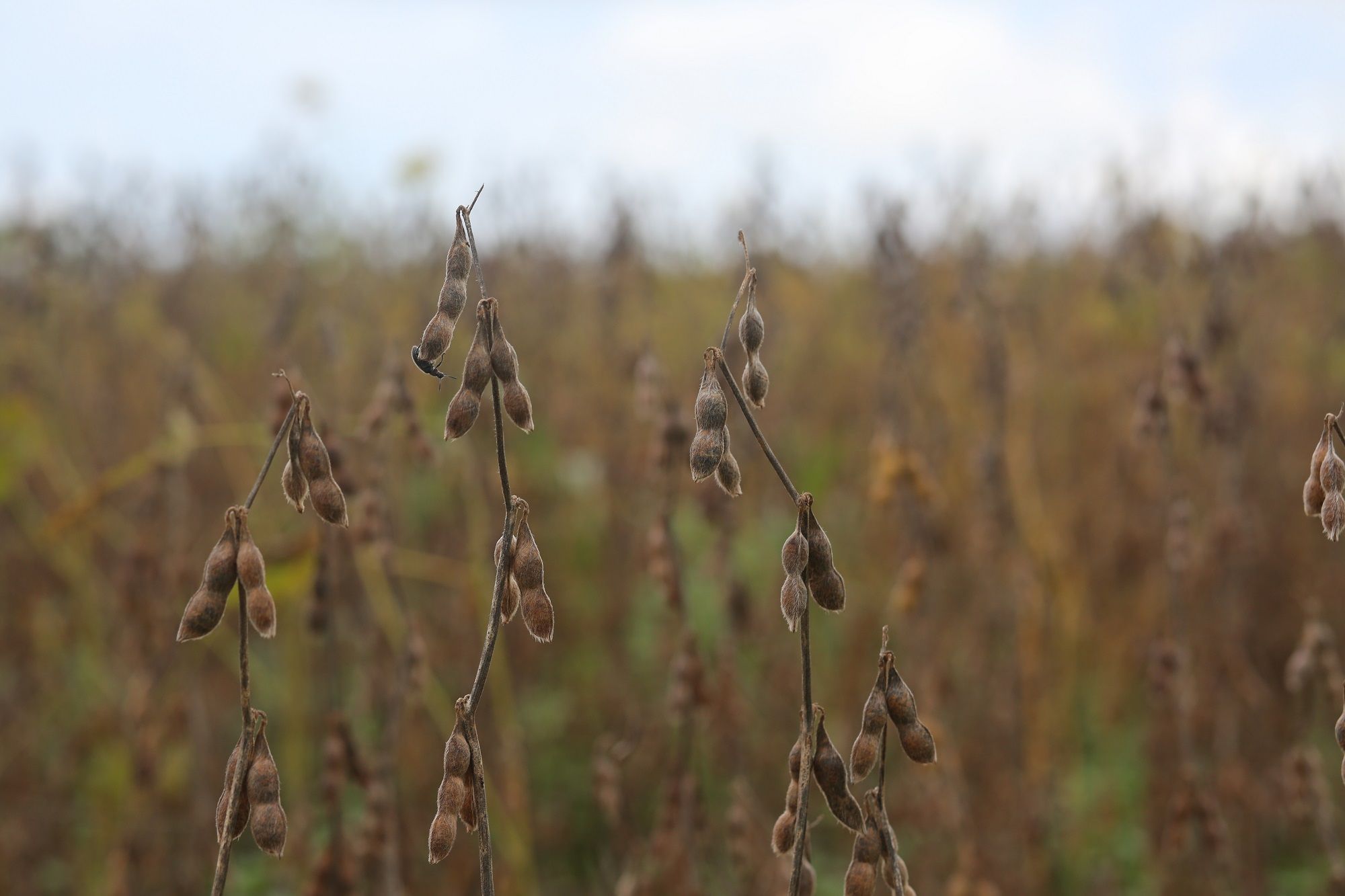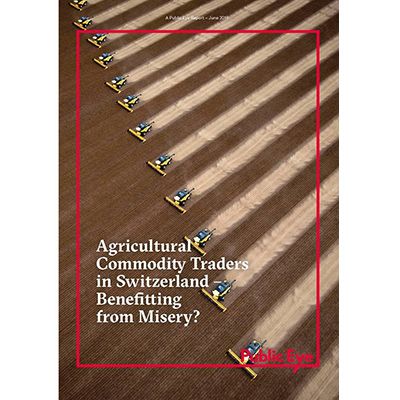Introduction to the Swiss agricultural commodity trade sector
 ©
Paulo Fridman / Bloomberg / GettyImages
©
Paulo Fridman / Bloomberg / GettyImages
In low-income countries, where many of the commodities traded by Swiss-based companies are produced, human rights violations are omnipresent, ranging from the lack of living wages and incomes, to forced and child labour as well as occupational health and safety hazards. Moreover, the risk of tax dodging and corruption has been shown to be high within agricultural production and trade.
Agricultural Commodity Traders in Switzerland – Benefitting from Misery?
Public Eye’s 2019 report Agricultural Commodity Traders in Switzerland – Benefitting from Misery? sheds light on the opaque sector of agricultural commodity trade and the human rights violations related to activities in this business. It also highlights Switzerland’s refusal to regulate the sector in ways that could address these issues, and it outlines ways to tackle the challenges at hand.
Growth and concentration: Transformation in the agro-food sector
Population growth, rising income levels and urbanisation are driving up demand for food. Growing demand for meat and agro-fuels leads to an even greater increase in the production of agricultural commodities such as soy, corn, and sugar cane. These developments have put in motion a structural transformation of the global agro-food system accelerated by technological progress and facilitated by economic policies biased towards free trade and an export-led development model. In recent years, take-overs, joint ventures and mergers have led to fewer multinational companies dominating different stages of agricultural value chains. Today, a small number of powerful actors control large parts of our entire agro-food system. In addition, many companies have come to exert considerable control over the production stage as well.
 ©
Paulo Fridman Corbis / GettyImages
©
Paulo Fridman Corbis / GettyImages
Severe human rights violations
Productivity increases in the agricultural sector have led to a downward trend in food prices, however the transformation of the global agro-food system has spectacularly failed to eradicate malnutrition and hunger worldwide. Furthermore, agricultural producers and other people eking out a living from agriculture have suffered enormously under the depressed food prices and in many cases are deprived of a decent living. Many of the crops destined for the world market, such as cocoa, coffee, or cotton, are produced in low-income countries, where the agricultural sector provides work for a significant proportion of the population. At the same time, human rights violations are widespread in the production of agricultural commodities, particularly in the Global South. Farmers can barely meet their basic needs with their income and workers can hardly survive on their wages.
While poverty wages are a fundamental issue, a myriad of other problems are commonplace, including forced and child labour, health issues due to the use of pesticides, the destruction of livelihoods through deforestation, and large scale-land acquisitions resulting in land grabbing.
Furthermore, the risk of tax dodging, aggressive tax avoidance, corruption and influence peddling is particularly high in commodity trading. These practices often result in human rights violations by reducing states’ capabilities and financial means to ensure the human rights of its populations are upheld.
 ©
Issou Sanogo /AFP GettyImages
©
Issou Sanogo /AFP GettyImages
Switzerland at the heart of global agricultural commodity trade
Until now little has been known about Switzerland’s role as a global agricultural trading hub. Public Eye investigated several of the world’s most important agricultural traders and their activities in Switzerland to shed light on this very opaque sector. It will come as a surprise to many that around 50% of global grain and coffee trade is handled by Swiss-based actors, and that 40% of globally traded sugar is dispatched from computers in Switzerland. Similarly, Switzerland has its hand in at least 30% of cocoa, 25% of cotton, and 15% of orange juice traded globally. There can be no doubt that the country has become one of the most important trading hubs for agricultural commodities and over the last decades many of the world’s leading agricultural traders have set up their trade offices along Lake Geneva or in central Switzerland. Lured by an attractive tax policy, a discreet and business-friendly environment and little regulation in relation to transparency or human rights protections abroad, most agricultural commodity traders remain largely unknown to the general public. This is also a result of the fact that commodity trading in Switzerland is comprised largely of so-called transit trade, so that goods traded via Switzerland do not show up in import and export statistics. This further increases the opacity of an already intransparent sector.
A problematic business model
A closer look at the sector reveals: The trading companies operating from Switzerland also handle processing and many have moved upstream into the production of agricultural commodities. They either own or lease land or enter into contract farming agreements, which allows them to exert considerable control over the production stage. Many Swiss-based agricultural traders thus cannot be regarded as pure trading companies but should been seen as global value chain managers instead. The move upstream into production creates more direct links between powerful traders and largely unorganised small-scale producers and workers. Because the latter two usually lack the bargaining power to negotiate better conditions or protect themselves against risks, these business relations are often all but fair. The very business models of agricultural traders are thus connected to the many cases of human rights violations in producing countries.
 ©
André Penner / Keystone
©
André Penner / Keystone
Lack of regulations, lack of enforcement
In producing countries, the cause of continuous human rights violations lies largely in the weak enforcement of laws and regulations. In the home states of agricultural traders however, the main issue is less one of enforcement but rather of an actual lack of regulation governing human rights protections abroad. Switzerland still relies largely on corporate social responsibility and has not, to date, issued stringent regulations to tackle human rights violations occurring along the value chains of Swiss-based commodity traders. The persistent obscurity surrounding the traders’ business compounds the problem. Here too, regulations requiring more transparency in the sector are in dire need.
 ©
Simon Dawson / Bloomberg Getty Images
©
Simon Dawson / Bloomberg Getty Images
Root cause: Power asymmetry
One of the reasons for both inexistent and feeble regulations, and weak enforcement in producing countries and home states alike, lies in the ability of large, financially strong market players such as agricultural traders to abuse their position of power. The unequal distribution of power observed in the global agro-food sector is not arbitrary. On the contrary, it is structural and deliberate as it enables and perpetuates a system that benefits the large multinational companies to the detriment of millions of people working in production or living in producing areas. Contrary to small-scale farmers and workers, multinational companies are in a position to shape, interpret and bend the rules governing the sector in their favour. This power imbalance is directly reflected in the insufficient policies governing human rights, transparency or competition, as these are often rigged towards already powerful corporations rather than the people in more acute need of protection.
What needs to happen in Switzerland
Switzerland, as a home state to many of the globally significant agricultural traders, has a central role to play in ensuring more balanced power relations along global agro-food value chains. Switzerland must ensure there is sufficient transparency in the commodity trading sector as well as mandatory Human Rights Due Diligence that covers high-risk activities and ensures respect for human rights wherever Swiss companies do business. Moreover, to resist the concentration processes in the global agro-food sector, there is a clear need for more effective and far-reaching competition policies. Agricultural traders as global value chain managers also have an important role to play in affecting change. This ultimately entails a fundamental shift in the relations between traders and people working in production, which is essential to ensure the human right to an adequate standard of living, among other rights. To this end, transparency regarding commodity traders’ business activities and relationships, their pricing schemes, as well as financial data, is a central requirement and would be a decisive first step.
 ©
Lunae Parracho
©
Lunae Parracho
Agricultural commodities
A myriad of definitions of agricultural commodities exists all of which differ slightly from one another in terms of which products they include or exclude.
Public Eye defines agricultural commodities, sometimes also referred to as soft commodities, as renewable raw materials that are grown both as food and non-food in agricultural production and that are traded globally. While not the focus of Public Eye’s work, this understanding includes meat and dairy products and products from fishery and forestry. Products that are not traded globally and are primarily grown locally and/or for subsistence purposes are commonly not included in definitions of agricultural cormmodities.
The starting point of this definition lies with the commodities, i.e. the actual raw materials, and not the final purpose of the products. This understanding includes processed materials, because very few agricultural raw materials are traded internationally in their original form (i.e. as field crops). All go through primary processing required for storage and transport (for example fermentation and drying of cocoa beans, concentration and freezing of orange juice, pressing of palm oil fruits).


